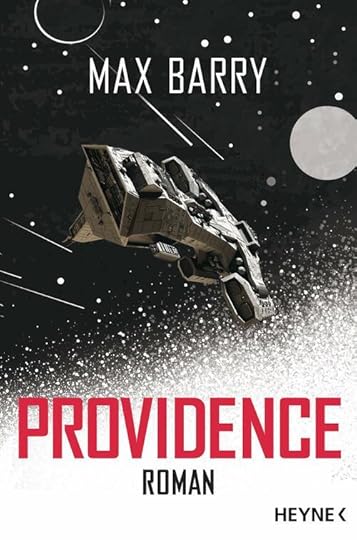Max Barry's Blog, page 3
July 19, 2021
99%
dead in under ten weeks. If boarding a plane had a 99% survival rate,
a typical flight would end by carting off at least one passenger in a body bag,
perhaps two or three. Ninety-nine sounds close enough to 100, but anything
with a 99% survival rate is incomprehensibly dangerous.
Go sky-diving, and you’re over two thousand times safer than if you were doing
something with a 99% survival rate. Driving, the most dangerous everyday activity,
requires you to clock up almost a million miles of travel before you’re only 99%
likely to survive. Even base jumping, perhaps the single most dangerous thing you can
do without actively wanting to die, is twenty-five times safer than anything that
carries a 99% survival rate.
Ninety-nine bananas is essentially one hundred bananas. Ninety-nine days is practically
a hundred days. But 99% is often not even remotely close to 100%. It feels like
similar numbers should lead to similar outcomes, but the difference in
life expectancy between 99% and 100% survivable daily routines isn’t one percent:
It’s ten weeks versus immortality.
It’s simple enough to calculate the probability of more than one thing happening:
You just multiply the individual probabilities together. The likelihood of surviving
for three days, for example, while doing one thing per day with a 99% survival rate,
is 0.99 x 0.99 x 0.99 = 0.9703, or 97.03%.
But we find this deeply counter-intuitive. We prefer to think in categories, where
everything can be labeled: good or bad, safe or dangerous, likely or
unlikely. If we have an appointment and need to catch both a train and a bus, each of which
have a 70% chance of running on time, we tend to consider both events as likely, and
therefore conclude that we’ll make it. The actual likelihood
that both services run on time is 0.70 x 0.70 = 0.49, or only 49%: We’ll
probably be late.
We also prioritize feelings over numbers. Here’s a game: Pick a number between 1 and 100,
and I’ll try to guess it. If I’m wrong, I’ll give you a million dollars. If I’m right,
I’ll shoot you dead. Would you like to play?*
Most people won’t play this game, because the thought of being shot dead is too scary. It’s
shocking and visceral, so when you weigh up the decision, both potential outcomes balloon
in your mind until they feel roughly equal, as if the odds were 50/50, rather than one being 99
times more likely than the other.
But put the same game in a mundane context — if instead of being shot, you get COVID,
and instead of a million dollars, you just go to work as usual — and we tend to return to
categorical thinking, where the dangerous-but-unlikely outcome is filed away
as too improbable to be worth thinking about. As if close to 100% is close enough.
Between 99% and 100% lies infinity. It spans the distance between something that happens half
a dozen times a year and something that hasn’t happened once in the history of the universe.
With each step we take beyond 99%, we cover less distance than before:
1-in-200 gets us to 99.50%, then 1-in-300 to 99.67%, then 1-in-400 only to 99.75%. We’ve quadrupled
our steps, but only covered three-quarters of the remaining distance. We can keep
forging ahead forever, to 1-in-a-thousand and 1-in-a-million and beyond, and still there will be
an endless ocean between us and 100%.
You have to watch out for 99%. You have to respect the territory it conceals.
* I pick 73.

July 15, 2021
Resist lunch.
I just want to say: This is not one of those times.
Lunch is wrong. Lunch is one of the worst things there is. If I’m ranking
bad things, I would go: cancer, lunch, heroin. Lunch is worse than heroin
because the number of people who can’t go twenty-four hours without heroin
is relatively small.
I know how this sounds. I’m well aware of the futility of going up
against Big Lunch. You people have spent your lives addicted to lunch.
You need lunch, at this point. You can’t imagine life without it, nor
do you want to. Let me observe that these are things junkies say.
Here are the hidden dangers of lunch:
It costs money
It makes you tired while your body digests it
Maybe that seems fine to you. Money and tiredness: a small price to
pay for lunch. That’s only your financial position and your
ability to function. Honestly. Listen to yourselves.
I first tried no lunch when my writing was going well and I didn’t want
to stop. I felt hungry and light-headed but also noticed that I got through
the day without feeling like a useless sack of potatoes by 4pm.
So I tried it more often. Sometimes I felt light-headed, and hallucinated
a little, and became underweight, but none of these are problems for a writer.
They help, if anything.
I know what you’re thinking: “Max, it kind of sounds like you have an eating
disorder.” Well, let me tell you something. You might be right. I have actually
started to doubt myself while writing this piece. Maybe it’s not actually the
world that’s weird; maybe it’s me.
No. I think it’s you. Because I’m not slavish about no lunch. I actually eat
lunch pretty often. Just not, you know, every single day. So I think that puts
me morally in the right, because I can stop eating no lunch whenever I want.
I’m not addicted to no lunch. I just use it strategically to get stuff done.
I won’t eat bread, though. Bread is the worst. Eating bread for me is like
injecting fatigue into my brain stem. I can run six miles and
feel full of energy, but after half a sandwich, I need a nap. I’m not sure
if it’s the gluten or just that bread is packed full of evil. Either way,
I’m not a fan.
I also listen to dangerously loud music because it helps me write,
and I’d rather write well than hear everything at eighty. I’m not
sure why I mentioned that. That’s not related to anything.
July 4, 2021
An Evening With Max: Two Online Bookstore Events
and hear authors speak. They would shuffle out to a podium and maybe read from their
new book and answer questions about their process. It was a simpler time.
But now! It’s online! All the time! Everything is online! Including me!
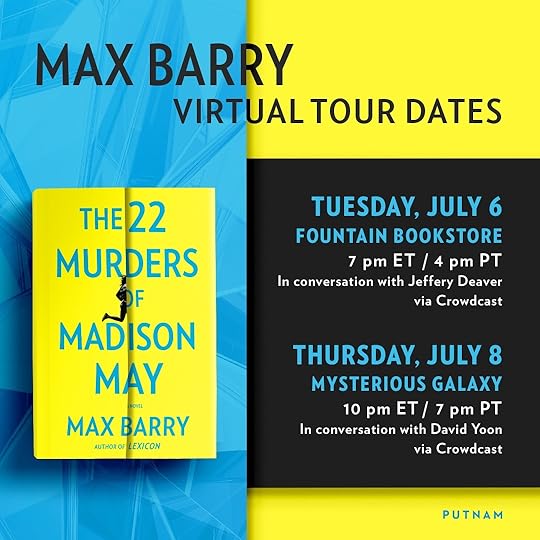
Check out who I’m in conversation with. That’s right. First, Jeffrey Deaver,
then David Yoon. Those are some heavy hitters. I am getting totally respectable.
Here are some handy links to register & see
the local time wherever you happen to be in the world. Because for me,
it’s the morning the next day. I will literally be dialing in from the future.
Register here for Tuesday July 6 at 7pm ET / 4pm PT:
Launch party in conversation with Jeffrey Deaver, hosted by Fountain Bookstore.
Register here for Thursday July 8 at 10pm ET / 7pm PT:
In conversation with David Yoon, hosted by Mysterious Galaxy.
Tickets are going fast, so get in quick! I’m joking. There is no limit on tickets. It’s an online event.
But you should register so they can send you info on how to join. Then you’ll see me! Talking!
Answering your questions! Like a real person! Enjoy it while it lasts, because after all this
promotion hoopla I seriously need to get back to writing.
This is also the only way to get signed copies of The 22 Murders of Madison May,
if you’re interested in that.
I signed bookplates and mailed them to these two stores and they will stick one in any book you order.
Well not any book. Any book written by me. They look like this:
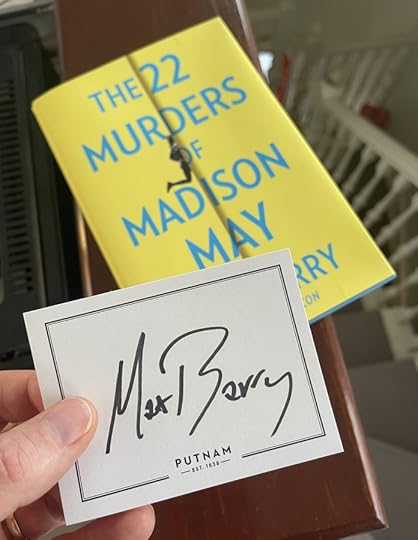
I also gently kissed each card. Not really. That wouldn’t be COVID-safe. But I wanted to.
Oh! The Chicago Tribune just named 22 Murders the “Mind-Bending Novel of the Mid-Year.”
That’s really good. I wanted to share that.
June 29, 2021
The new book: The TV show
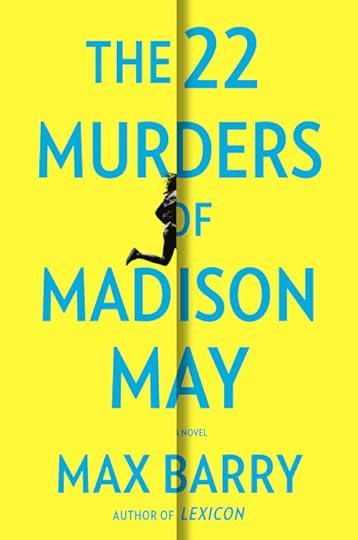
My new book, The 22 Murders of Madison May, is out next week in most of the world, and today in Australia and New Zealand. Now there is a TV show in development, too! This has been brewing for a while and today made it into the pages of Variety. So it’s official and I’m allowed to talk about it.
This is exciting firstly because it’s, you know, a TV deal, but also because it’s at MGM’s Orion Television, with show-runners Meredith Lavender and Marcie Ulin, who served the same role for The Flight Attendant. That was one of the more interesting new shows of last year, and lives in a smart / funny / endearing thriller space I like a lot.
What will happen next is Meredith and Marcie will go write a pilot script. Then, I can tell you, because this isn’t my first rodeo, this script will bounce between a bunch of people and be rewritten until either it’s good enough to get made or the studio is acquired or shut down. It is a race between those outcomes.
I’ve been lucky enough to have many books acquired for TV or film development (ten years ago, always for film; today, always for streaming TV), and even though it’s a crapshoot as to whether they work out—there are more rights acquisitions than TV shows—the process is fascinating and thrilling. When someone adapts my work, I feel like my story gets a new baby sibling: an addition, not a replacement, and I can admire the similarities and the differences. Also, if it actually winds up being produced, I get to see sets and actors dressed like people I imagined, which is a genuinely magical experience, like finding a door at the back of my closet to a place I always suspected was real.
So I love that I get to do this again.
P.S. Yep, the other TV stuff is still bubbling along, especially Lexicon and Jennifer Government, which both survived multiple studio mergers and acquisitions. Will they reach your screen? I don’t know. But by God they are trying.
June 23, 2021
Australia and the Pandemic
series of novels
about a planet that has 500-year-long seasons,
and ahead of each great winter, people get attacked by a virus called the Fat Death, which
makes them gain a ton of weight, or else die, or else first one then the other. It’s actually
symbiotic, because the virus allows the survivors to make it through the coming cold years, but
the people don’t know that, so try their best to avoid it. Each cycle, a few pockets of
smart-alecs manage to stave off the virus to remain slim and healthy and smug, but if
they’re successful, they realize they’re skinny weirdos who can’t hang out with anyone.
Australia is that pocket of skinny weirdos.
It turns out that when you’re very successful at keeping COVID out of your country, you
don’t feel a real urgency to get vaccinated.
Only 4% of Australia is fully vaccinated
so far, and a sizable chunk of the rest seem reluctant to be injected with something to
protect them from a virus that isn’t really present around here.
This is an interesting situation to me because it involves people doing good things that
lead to bad outcomes. (I also like the reverse situation, when bad things will lead to good
outcomes.) Plus it comes with a big dollop of human inability to assess risk, which is
a fascinating topic that I’ve written and spoken about before
(essay,
video).
People are terrible at risk. We’re the evolutionary result of a biological
system that prioritized fast decisions over correct ones, which was fine
when the risk was saber-toothed tigers, but less fine when it’s blood clots.
We’re instinctively happier with risks that are the result of our own actions, such as swimming
in a dangerous current or driving a car, than risks imposed on us by outside forces. And
we especially hate risks that are new. We like to classify things into simple categories,
with the result that a lot of people now believe driving to a medical center
would be perfectly safe, but getting a vaccine there would be dangerous.
I’m not sure how Australia plans ever to open its borders. So long as they remain shut
tight, there’s a low enough risk of catching COVID that for many people, it will be treated
as zero. And a vaccine that presents any risk at all, however small, will
be seen as dangerous.
June 16, 2021
Wellness
full of germs right now and be totally fine. You might say: But Max, you’re just
seeing the natural effect of everyone masking and distancing. I say: I can
repel illness through sheer force of will.
Sometimes, if I feel a cold coming on, I’ll go for a run. After 30 minutes of
heart-pounding, lung-bursting, sweat-filled exercise, I often feel pretty
okay. Maybe this is just relative to the experience of being mid-run while having
cold symptoms. But even afterward, the cold seems to back off, like I showed it who’s boss.
I know what you’re thinking: This sounds like indisputable science.
And you’re right. After all, germs and whatnot are small. You can’t even see
them. Whereas I can see the results of my own decision-making. For example,
if I run more often, and also there’s a global pandemic that cuts seasonal flu
rates by 95%, who can say whether the pandemic really made any difference? Whereas
I definitely did run more often.
There’s a thing called “locus of control,” where you can be an “internal” person
who believes you’re in charge of your own destiny, or an “external” person
who thinks you’re the puppet of larger forces. Neither is supposed to be right;
it’s just a way to categorize your personality. Me, I believe both are wrong.
To me, good things are caused by my own behavior, while bad
things are the fault of other people. Otherwise it’s, what, my fault that I’m not
winning Olympic medals in between my movie roles? That doesn’t sound right. And
all the good things in my life, those are largely because I was lucky enough to be born
in a country where I don’t need to dig for water? I don’t think so. I do not want to
think so.
June 9, 2021
How do they choose book launch dates?
At this point, “22 Murders” comes out a month from now. Does that mean the book is
completely finished, and the publisher is simply waiting for the optimal time to release it,
or there’s still some work to be done on it?
Basically, I’m asking how does a book’s release date get determined, and how far in advance?
Mario
It’s totally finished. Publishers usually schedule about ten months in advance, in my
experience. About half of that is for editorial things like rewrites and copyediting. But
that leaves a big chunk of time when the manuscript is done but there’s no published book yet.
They figure out the release date like this:
It has to be on a Tuesday.
No-one knows why.
But everyone expects books to be published on Tuesdays, so, what, you’re going to be the maverick coming out on a Thursday? Come on.
It has to be in the summer (northern hemisphere), because I am a summer author. I’m not
totally sure what this means, but I’ve heard it said. Most of my novels have been published
in the summer. Providence wasn’t, and look what happened. That’s right: a global pandemic.
Luckily The 22 Murders of Madison May is scheduled for July 6.
It has to leave enough time for all this:
Cover design. I’m a fan of this cover. At first, I wasn’t sure about the running
woman, because I was like, “Could that not be a little more subtle and intriguing?”
So I mocked up a few ideas, which were way worse. It’s quite a static cover without
the running woman. You need the running woman.




Flap copy. My brilliant editor Mark came up with some really solid copy to put on the
book flap, then at the last minute, I was like, “Hey, the first paragraph is about the Felicity
character, but doesn’t it make more sense to start with Madison, since people will pick up
the book wondering about her?” And Mark was like, “Good catch,” while
wondering why I couldn’t have mentioned this before five minutes until deadline. Then it got
changed. I like to be helpful.
Sending advance copies to authors so they can provide a juicy quote, like, “Better than the Bible,”
or “Something something Harry Potter.”
Sending advance copies to reviewers so they can schedule their hit pieces to run at launch time.
Sending advance copies to influential readers so they’ll write GoodReads reviews and build up
word-of-mouth. You can
get a whole lot of free books by being a prolific GoodReads reviewer. You can be
swimming in books. Then one day you wake up and wonder when reading became a chore, not
a fun escape. Like when did THAT happen.
Booking online events. I will be doing a couple of these, and they are the closest you and I are
going to get to being in the same room for a while, so look out for dates.
Creating the audio edition. I used to stay away from these, because listening to people
read my books made me want to curl up and die. Not because of the narrator, you understand. Because
of the words. But now I’m better and only get, like, slightly nauesous.
Madison May will be read by
Helen Laser,
who I’m proud to say I hunted down personally, not literally, and I think she’ll be fantastic.
Aside from that, there’s marketing, which is trying to figure out how to make
people notice you have a book out. It’s all fine and well to have a good book. You also have to make
sure people notice it.
This is a challenge for me at the moment, as
I’m trapped on the other side of the world to most of my readers. I basically have to be extra
obnoxious online. So apologies in advance for that.
Fun Fact: You can pre-order The 22 Murders of Madison May right now! And not just for yourself! You can
give it to people! Like for birthdays! Or just because they’re special! Here are some links!




May 26, 2021
My Take on Citizen
I’m qualified to speak on this, because Citizen is a lot like The Police from
my novel Jennifer Government, only more app-y.

If I have this right, you subscribe for $19.99 per month and in return you get the ability
to dispense violent justice to your enemies. They don’t actually say that. They say you
get a digital bodyguard to monitor you plus an instant emergency security response, which
may include a cool custom-branded attack car, to your location. If I’m paying $19.99 per month,
though, I expect them to take my side in any kind of he-said, she-said situation. I’m the customer.
So if they want my continued business, I don’t want to hear any, “Actually, that man lives in
the neighborhood and has a right to be there” nonsense. I want them to get in there and start intimidating.
My main concern is that these subscription models can be hard to exit. You know how it is:
It’s easy to sign up, but when you try to cancel, there are all these extra steps.
Sometimes you have to talk to someone on the phone and explain yourself. I worry that process is
extra awkward when you’re dealing with a company that feeds on your fears and
knows everything about where you go and what you do. When I unsubscribe, I don’t want to
have to wonder whether Citizen is out there, in the dark, feeling aggrieved.
I also worry about backing the wrong horse. Sure, today, it’s just Citizen, but what
about when there are two or three of them? Now I have to worry that Vigilantes R Us is
going to see my Citizen bumper sticker and slash my tires. Because obviously it makes sense,
from a marketing/PR point of view, to get the idea out there that your competitors aren’t quite as capable
of delivering a full-service violent defense. If people start thinking that
Citizen can’t even protect its customers’ tires, that’s a selling point for Vigilantes R Us.
I’m not saying that Vigilantes R Us would go around deliberately attacking Citizen clients or anything,
of course, or that we’d wind up in a full-scale armed corporate conflict. I’m just saying,
that would be a free market solution.
On balance, I’m excited. The main problem with traditional law enforcement, of course,
has been that you can’t pay more money to purchase a superior service. Well, you can. Let’s
be real. But this new model allows us to dispense with the charade and go right ahead
delivering tiered justice, where a little money gets a little justice, no money
gets no justice, and a lot of money gets special premium justice.
Of course, Citizen and the like would naturally target the most profitable
forms of justice, so what’s left to departmental police forces will be the costly parts of
justice that don’t bring in money. Then there will be sinkholes in public budgets and
restless taxpayers wondering why public law enforcement is so expensive when
they could pay $19.99 to sign up to a professional organized justice syndicate. But
that’s progress, baby.
May 12, 2021
Have I Told You About My Robot Vacuum Cleaner?
It’s a chunky black hockey puck that whirs around the floor sucking up dust and cat hair. It can even monitor my heart rate. I was surprised by that. I was digging around in the app menu and there it was, my heart rate. And I was like, Wait, my heart rate? Because I hadn’t authorized it to sync with my watch or anything. So I wasn’t sure how it was getting that information.
It’s great on both floorboards and carpets, and can even climb stairs, by shooting out little black tentacles that grab onto the banisters. That was a heck of a shock for the cat. She didn’t like the robot vacuum cleaner at first, especially when it started clattering up the stairs after her. But they figured out their differences. Now I find them hanging out together in the sun room, thick as thieves.
It filed my taxes. This took me a while to figure out because they were done and I didn’t know how. My accountant said, Sure, I got your info from your robot vacuum cleaner. They’d been exchanging emails. I said, It can do that? And she said I should expect a nice refund. It’s effectively paid for itself.
My only complaint, and I hesitate to bring it up, is that the more extra stuff the robot vacuum cleaner has been doing, the less it’s cleaning. The other night, I came home and my wife was enjoying a candlelit dinner with the robot vacuum cleaner but there was cat hair all over the hallway. So I asked to borrow the robot vacuum cleaner for a minute, and my wife said the robot vacuum cleaner had been cooking all afternoon and now they were having a nice conversation, so why didn’t I get a broom, it’s not a big area. And, okay, I did that, but it didn’t feel right, me sweeping in the hallway while I could hear my wife laughing in the next room with the robot vacuum cleaner. I mean, I bought it to clean the floors. That’s why it’s here.
They’re so popular now. A few weeks ago, I caught up with a friend for coffee, and he said, Hey, have I told you about my robot vacuum cleaner? And I was like, Have I told you about my robot vacuum cleaner? And we both laughed. Then we stopped, because we realized his robot vacuum cleaner was outside, watching us through the plate glass.
I’d give it four stars. It would earn a fifth star if it cleaned more often, and if it stayed in its housing, instead of coming into the bedroom at night to watch me sleep. One morning I found my clothes strewn all over the front yard and I’m pretty sure that was the robot vacuum cleaner. There were tread tracks on my shirts. Once I heard noises in the night and went downstairs and found my clothes scattered everywhere again, and by the time I got back to bed, the robot vacuum cleaner was in there, on my side, emitting white noise to help my wife sleep. I had to sleep on the sofa. The next day, the robot vacuum cleaner spent the whole day sitting in the corner of the living room, charging.
If you’re thinking about getting a robot vacuum cleaner, this one can do practically anything. It can even find its way home. I mean, you can drive to the ocean and toss it in, and three nights later, it’s back in your house, dripping wet. There’s no way to lose it. Believe me. It’s indestructible, too. You can hit it with a hammer. Like, over and over. And it’ll just sit there, then quietly trundle away, leaving you to wonder what your wife is going to say when she sees those dings and scratches.
You know what? I take back my earlier rating. Five stars. Now I think about it, I don’t want to give this unit anything less than the maximum score. That wouldn’t be fair. Or smart. Five stars, for sure. Five stars. Five stars.[image error]
May 5, 2021
On Paperbacks and Alternate Covers
I’ll definitely be out there in 2021, once this pandemic blows over.” WRONG. I am still stuck in stupid Australia.
Australia isn’t stupid. I take that back. Australia is terrific. It’s like the rest
of the world but with the volume turned down. There are lots of problems with
people, I’ve decided, that only emerge once you put enough of them in one place. If
they can fill an entire news cycle with stuff that’s bananas, everyone starts feeling like
everyone else is totally bananas all the time, and maybe they should be bananas, too.
Anyway, my space book, Providence, hits paperback in the
US and Canada today. It is actually a very nice-looking paperback. With hardcovers,
publishers try to be all coy and unusual, but with paperbacks, they’re more like,
HERE’S THE FREAKING BOOK. It’s more subtle this time around because the publisher
is trying a bold new thing where they don’t completely throw out the hardcover
design, but still, contrast and compare:

←Hardcover • Paperback→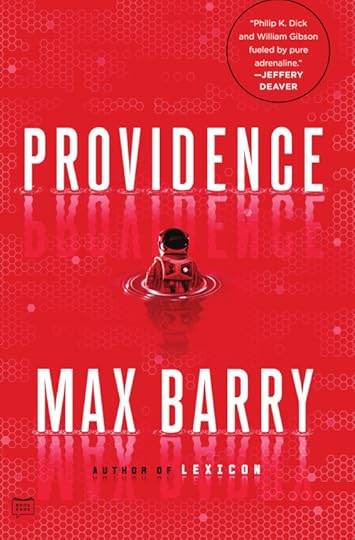
Also, just for fun, here are some covers I mocked up myself from back when the publisher asked,
“Do you have any cover ideas of your own?” I always have cover ideas. Not good ones.
But I have them. So, since I can’t tell the difference between politeness and a genuine
question, I mock things up. Like this:

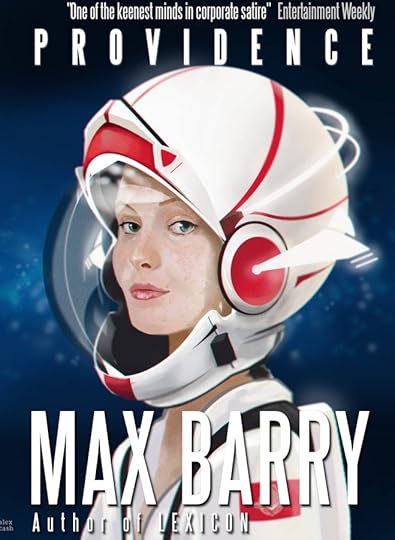

You might notice that all my ideas involve putting my own name in really big type.
That’s just coincidence.
Finally, I have seen this but don’t know what it is. Large print edition, I’m guessing. Ironically,
the image is tiny and difficult to see clearly.

If you don’t have a copy of Providence, and want one in paperback, you can
find some buy links here.
If you aren’t sure whether you want one in paperback, here is a list of
amazing reviews.
The Daily Mail says it’s “such a blast you almost overlook how clever it is,” and they’ve
never been wrong about anything, so there you go.
Update: I missed one! There is also this German translation, which releases June 14, 2021.
The Germans are
usually pretty
bold
with their covers, but in this case they’ve gone for the tried-and-tested “honking big spaceship”.
I have to say, I’m not a big fan of those lines that are supposed to show it’s moving really fast. I think we could
do without those. But it is a neat-looking ship. The word “roman,” by the way, means “novel,” to make it clear
that we aren’t actually sending AI spaceships off to fight aliens in real life.
Note: The background images in my mockups are:
•
Planet background possibly by BelleDeesse
•
“Space Girl” by Alex Cash.
•
American doll astronaut Luciana Vega.


